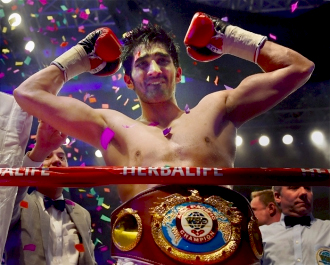New Delhi, Jul 18: Vijender Singh has had to unlearn a few tactics from his amateur days in his unbeaten journey to the WBO Asia Pacific title, reveals the Indian boxing star's renowned British trainer Lee Beard who "makes it hard for him in the gym to make him more spiteful and angry in the ring".

"All his amateur experience has been a huge help for him because he has won on some very big occasions –- Olympics, World Championships. By the time he turned pro, he had already learnt to deal with pressure. He was smart and skillful even before he came to me. I have only added to his game, made him think differently," Beard said.
"I have tried to make him punch harder and harder and use his jab more. His footwork used to slow him down because as an amateur he used to run around in the ring. The main thing he has unlearnt is the footwork from amateur days with regards to running around the ring. It's no good for a 10-round bout," he added.
Beard, who fondly calls Vijender just V, said another aspect of the Indian's game he has tried to improve is his defence.
"He is more fluent now, there is bit more rhythm. His defence is also so much better now. Now when you see him in the ring, it is not easy to connect to him because he is walking, turning, his defensive jab has improved a lot. His all-round understanding, his patience and control over the fight has improved.
"He can't be reached that easily. I have educated him about energy because in Olympics it is just three rounds so the pace is very fast. But in pro, you have to slow it down a bit.
"When I spoke about energy with him I said 'V, there is a glass of water here, when you drink it the level goes down, imagine that is your energy. So if you are in the fight, and every time you throw a punch, it is like you are drinking and the level will go down. So you have got to be careful that you don't empty it before the final bell'," explained the Manchester-based coach.
Beard said he could see a world champion in Vijender the day he met him first in Manchester last year.
"When I first saw him, it took just 15 minutes for me to gauge that he will win a world title. I looked into his eyes and I saw a fire. Whatever he seems to focus on, he gets it. Of all the fighters I have trained, he is one of the best when it comes to learning, he is an extremely quick learner," he said.
Vijender, who holds the distinction of being India's first Olympic and World Championships medallist, won his first six pro bouts via knockouts before being stretched to a 10-round win in the WBO title clash against former WBC European champion Kerry Hope.
Beard said that Vijender had to battle a few niggles in the run up to the fight. "It was just hard for him with the injuries, this is psychological. He was stressed...He was not scared of the opponent it was more about the occasion, about fighting in India and how India would respond to it. The opponent was nothing, the attention was the factor," Beard said.
"What Vijender did was huge, because he performed despite all that he went through in training. I pushed him really hard. He was doing 10-12 rounds every day with three different quality opponents, who were trying to destroy him. They were not doing him any favours, they were pushing him," he said.
"On Saturday, he needed to stay in the middle, he needed to take his time. Vijender got tired in the fight. They were both tired. But Vijender is a very smart man, he is a thinking fighter. He doesn't rush things all the time. He was more in control of the pace of the fight."
On his personal equation with the reticent Haryana-lad, Beard said he has been bowled over by Vijender's humility. "I have got 5-6 guys in my gym, one of them is an 18-year-old boy called Jason. I like the way Vijender is with him. Jason is a very very quiet boy but Vijender always talks very good with him.
"When you have got a three-time Olympian in the gym, you worry about their ego but it is not like that with Vijender and Jason is an example of that. Jason is irrelevant to Vijender but he shows affection for him which I really like. I have a very good bond with him. The communication with him is very good. I know how to calm him down," he said.
"Our equation now is such that when V walks in, I can look at him and tell him whether he is feeling strong or not. I can understand when something is not right." Asked about his India experience so far, Beard said he was amazed to see such a huge turnout for Vijender's fight even though most fans in the arena simply had no clue about the sport.
"Most people I spoke with on Saturday didn't even understand what was going on. They were going crazy about every punch Vijender was throwing. I was talking to a few fans when the undercard was on and I was asking them, who do you think will win? They simply said 'we don't know, we are here for Vijender', I was amazed. They love the man but they didn't know what was happening," Beard chuckled.





Comments
Add new comment